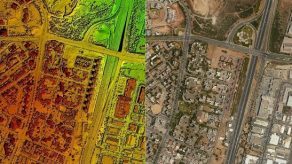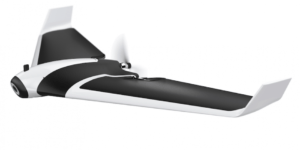
While China dominates much of the drone manufacturing discussion, and a new drone software and data company seems to appear every day in the US, Europe’s drone industry doesn’t always get the play it should. But with many European countries offering industry-supporting regulations, a robust appetite for commercial drone applications, and an innovative research and academic infrastructure supporting work in drones and robotics, Europe’s drone industry is thriving. Here are the top 5 European drone companies to watch right now.
#1. Delair-Tech

Toulouse-based drone company Delair-Tech focuses on industrial and enterprise solutions. They sell a big solution – drones, services (sometimes including pilots to fly the drones) and data solutions; and they sell to big companies. With the largest French energy company as a flagship client, other major industrial enterprises have followed and the company has been able to partner deeply in industrial verticals to develop robust solutions.
Those deep partnerships with powerful enterprise have also allowed Delair-Tech to collaborate early on with regulators, helping to support the entire industry. “BVLOS flight has been allowed in France since 2012,” says Michael de Lagarde, Delair-Tech’s CEO. “This really opens a lot of options and a wide range of applications.”
With a variety of hardware choices and a broad base of industrial expertise, Delair-Tech is providing solutions in a large number of verticals. Energy, Infrastructure, Agriculture, Geospatial, Security and Defense, Mining – if the industry uses drones, Delair-Tech has a presence. And their experience with BVLOS flight means that they are expanding applications to include long-range monitoring of power lines, railroads, roads, and other new uses for drone tech.
The company is well-funded and well-respected, combining significant longevity (for a new industry) with an impressive list of clients and a tested solution set.
#2. Flyability
 Swiss company Flyability offers Elios, a collision-tolerant drone. Instead of relying entirely on necessarily imperfect sense and avoid technology, they take an innovative approach: the drone is inside of a freely rotating cage.
Swiss company Flyability offers Elios, a collision-tolerant drone. Instead of relying entirely on necessarily imperfect sense and avoid technology, they take an innovative approach: the drone is inside of a freely rotating cage.
The cage means that the inspection drone can be used in a new way – in new spaces. “The art of indoor inspection is not as advanced as outdoor inspection,” says Marc Gandillon, Flyability’s Marketing Manager. “You have no way to geo-localize your drone indoors.”
The drone’s industrial value is incredibly high for work like inspecting the inside of storage tanks or other dark, dangerous and inaccessible spaces. Where previous methods of inspection can involve weeks of dangerous and costly preparation and scaffolding just to see what might need attention, the Elios can be placed in a small and sightless space and flown around to make an assessment, impossible to do without a drone and equally impossible with a traditional quad. “You need a new flight paradigm – using your environment to find your way, rolling on the walls and ceiling,” says Gandillon. “The cage removes the fear from the process – you can enter any kind of space without being afraid of hitting anything.”
The company was founded by cousins Dr. Adrien Briod and Patrick Thévoz, who were inspired by the Fukushima disaster. The realization that there were no robots available to help deal with the problem drove them to create a solution – with Adrian writing his Ph.D. thesis on the subject. Since launching the Elios in 2016 the company has not only provided a valuable industrial tool but has donated the product to “Robotics Without Borders” for use in disaster response.
#3, 4, and 5. The Parrot Drone Empire
Founded in 1994 by Henri Seydoux, Paris-based Parrot [EPA: PARRO] “creates, develops and markets high-tech wireless products” for commercial and retail markets. The company makes drones, automotive communications and infotainment solutions, and connected sound and gardening products. (We didn’t get it at first either: but the Parrot Pot is an $80 self-watering flower pot.)
While Parrot – like most drone manufacturers – went through a period of trimming down and refocusing its drone divisions last year, it seems to have come out the other side stronger than before. With Parrot’s investment in Swiss companies senseFly and Pix4D back in 2012, they carved out a significant space in the commercial drone industry, adding to their major position in the recreational space.
 Parrot Drones
Parrot Drones
Parrot’s had a major stake in the recreational drone business for years, with the popular BeBop and Disco drones. The company has now defined and expanded their offering to cover all sections of the drone market. They offer a range of mini-drones for fun and racing, the senseFly eBee for industry and large enterprise and now, in the middle, a professional offering. Parrot Professional isn’t an entirely new product, says Parrot’s Chief Sales and Marketing Officer Chris Roberts. “It’s more about bringing the best of the best from the Parrot ecosystem – we take the proven consumer drone, do slight modifications, embed a high precision sensor, and add the control and post-analysis software,” he explains. “It’s everything that you need to get going for a multi-purpose work tool.”
With Parrot Consumer, Parrot Professional, and Parrot Commercial the company has all the bases covered; which should help them to achieve their global expansion goals. Roberts says that the introduction of Parrot Professional is the logical next step in a strategy for market dominance. “It’s not a shift – it’s leveraging the product suite that we have. It’s our ambition to be dominant in all three.”
senseFly
SenseFly is the creator of the well-known eBee drone – an ultra-lightweight fixed wing. The eBee is strictly commercial: its price tag makes it an enterprise solution. But the eBee’s truly unique weight and size mean that its safety case is almost self-evident. No rotors, no sharp edges, and no heavy objects make the eBee an excellent choice for many applications as well as a regulatory favorite.
In addition, the eBee is launched by just throwing it into the air; making it far easier for many professionals to fly. Brock Ryder, senseFly’s Swiss Sales Director, says that’s the point: “We’re not here to create pilots – ease of use is key,” says Ryder. “We’re here to sell to industry experts. We want to make sure that we make their lives easier.”
While senseFly is a hardware manufacturer, they’ve worked to provide more value. “We’re trying to focus on that end-to-end solution,” says Ryder. ” We’re expanding partnerships with the best vertical solutions… In the professional market, they don’t want cheaper solutions- they want a complete solution.”
SenseFly works hard to dive deep into verticals and figure out the best value for their customers, but the applications for the eBee continue to expand. “We still get amazed all the time at how people use our tools to do things that we’ve never thought of,” says Ryder.
Pix4D

Drone mapping and modeling software provider Pix4D is a major player in drone software solutions. Pix4D offers precise, georeferenced 2D and 3D maps and models. They’ve come up with creative uses for their output, including elaborate real estate and construction models which are fascinating to play with. Pix4D has covered the entire commercial workflow, with tools from data capture hardware (through their partnership with Parrot) to analysis and delivery to the client.
Founded and run by scientist and photogrammetry expert Dr. Christoph Strecha, the company now has offices in Switzerland, China, and the US. Strecha’s academic roots are seen throughout the company: which values adaptability, new ideas, and community. In discussing the company’s developments in 3D modeling, Strecha says that commercial applications are evolving quickly. “Even in traditional surveying and mapping, the needs are changing,” he says.
Pix4D is also very active in working with organizations to bring drone technology to underserved communities or for disaster relief. The company has done work all over the world to assist after hurricanes, earthquakes, and other disasters. “To give people ownership of geospatial information is a powerful thing,” says Strecha. “And demonstrating that drone technology is good… that is everyone in the industry’s responsibility.”
The best of Europe’s drone industry is leading the way in many areas: with new commercial drones, the development of new markets, and in innovative data solutions. European drone companies have a global reach – and are influencing customer expectations around the world. “Our culture supports investment in new technology and innovation,” says Parrot’s Chris Roberts. “That facilitates tech and startups.”

Miriam McNabb is the Editor-in-Chief of DRONELIFE and CEO of JobForDrones, a professional drone services marketplace, and a fascinated observer of the emerging drone industry and the regulatory environment for drones. Miriam has penned over 3,000 articles focused on the commercial drone space and is an international speaker and recognized figure in the industry. Miriam has a degree from the University of Chicago and over 20 years of experience in high tech sales and marketing for new technologies.
For drone industry consulting or writing, Email Miriam.
TWITTER:@spaldingbarker
Subscribe to DroneLife here.









[…] named French company Delair-Tech as one of the top European drone companies last year – not just because of their time in the industry and robust enterprise solution, but […]